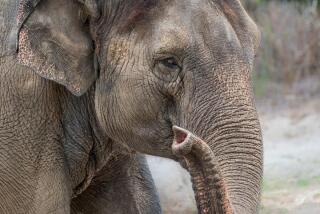Zoos without elephants: a lesson in compassion
In his Dec. 9 column, “Zoos without elephants would be a loss for the children of L.A.,” Hector Tobar protests the possibility that Billy, a 23-year-old Malaysian elephant held captive at the Los Angeles Zoo for nearly two decades, might go to a sanctuary and the zoo’s exhibit might be closed forever.
Billy’s two remaining elephant companions recently died. Thirteen elephants, according to In Defense of Animals, have died at the L.A. Zoo, many of them before they reached the age of 20; the natural life span of elephants is 65-70 years. Given these statistics, Billy’s age is a concern. In light of the mountain of evidence that has accumulated over the last three decades showing the extensive and profoundly adverse effects of animals’ emotions on their physical health, this is not at all surprising.
Despite his youth, Billy already shows signs of aging and hardship. Beyond suffering from tail abscesses and other infections, he has developed a stereotypy -- a repetitive head tic that is indicative of severe duress commonly found in confined animals and humans. Again, this is unsurprising. Elephants share common brain structures and functions with us. They recognize themselves in mirrors and thus have a sense of self similar to humans. Elephants also suffer from the stress of forced incarceration, physical deprivation, social isolation and other trauma. Consequently, when children see Billy, they are looking at someone not too much different from the children they see on the news who are victims of war and genocide -- sentenced to live without family and friends under harsh conditions that resemble a prison.
Tobar is aware of the evidence for trauma and suffering on the part of this animal, which makes his response nothing short of stunningly callous. He seems to think that people have a right to see and do whatever they want, even if it means great harm to another individual, in this case, an elephant. We are sure Tobar would not concede that this is his viewpoint, but he appears oblivious to his own insensitivity. His argument is a chilling example of how our institutions of captivity (zoos and marine parks) have been successful at “breaking us in,” that is, conditioning us to think in ways that culminate in such attitudes.
Tobar claims he is concerned about the impact that losing the elephant exhibit would have on children. In doing so he, attempts to frame the issue as elephants versus children. He knows better than that. He knows there are many things that his and other children will never experience. Most children do not grow up to pet a dinosaur (indeed, none do), climb Mt. Everest or dance in the American Ballet Theater. Tobar knows that no child suffers because of lack of these experiences. They will grow up to lead happy, meaningful lives without these experiences. The same is true of seeing elephants in zoos.
We argue, in fact, that seeing suffering animals at zoos has a negative impact on children. Children come to learn that other animals are commodities to be controlled and exploited. They come to learn that we need not be concerned about suffering as long as we are entertained -- yet we expect these children to become ethical, caring adults. This is irrational.
We agree with Tobar on one point: Zoos without elephants would indeed have an impact on children. It would be a lesson in compassion.
Lori Marino is a senior lecturer in neuroscience and behavioral biology at Emory University. Gay Bradshaw is executive director and founder of the Kerulos Center, a nonprofit organization that studies animal psychology and trauma recovery. Randy Malamud is a professor of English at Georgia State University.
More to Read
A cure for the common opinion
Get thought-provoking perspectives with our weekly newsletter.
You may occasionally receive promotional content from the Los Angeles Times.





